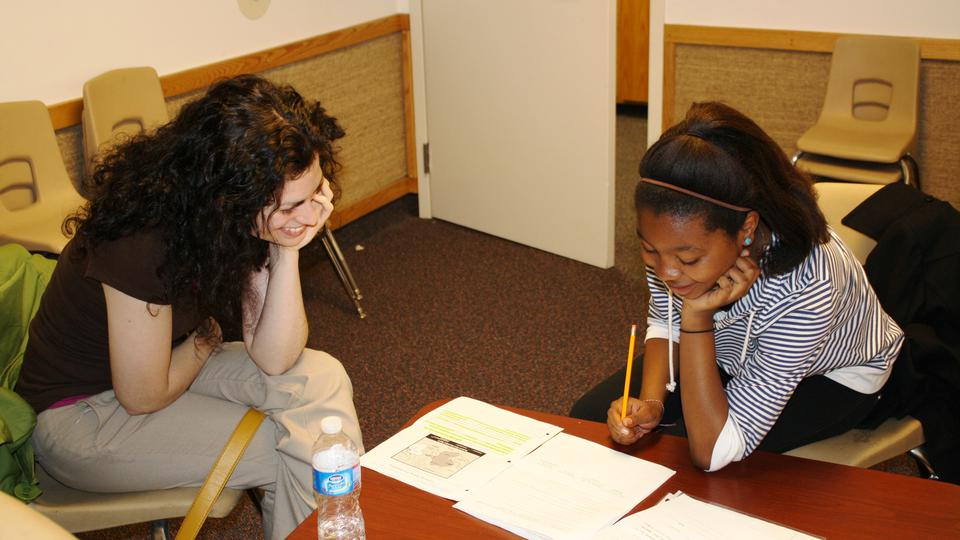During the era of the economic upheaval known as the Great Depression, The Church of Jesus Christ of Latter-day Saints announced the formation of an innovative welfare program. In a 1936 Churchwide address, the “primary purpose [of the program] was to set up a system … where independence, industry and self respect be once more established amongst our people.”
That mantra continues as congregations of the Church throughout the world reach out to assist those in need. Implementing the basic principles of welfare — love, service, work and self-reliance — frequently occurs among Latter-day Saints worldwide.
| Volunteer tutors young girl in Washington D.C. 2012 Intellectual Reserve, Inc. All rights reserved. | 1 / 3 |
Houston, Texas, Church leader Elder S. Gifford Nielsen explains that effort in his community. “The teachings of Jesus Christ are clear with respect to our responsibility and opportunity to help the needy in our communities, whether they are members of our Church or not. We have been blessed by having the capability to produce a basic food resource that we are happy to share with others. We love the Lord and we love our neighbors.”
Elder Nielsen refers to the “basic food resource” of peanut butter. A Church-operated peanut butter plant in Houston has recently been expanded to significantly increase production of the commodity. Both Church and community volunteers staff production at the processing plant. The facility now produces 700,000 jars of peanut butter annually. Of that inventory, 200,000 jars are donated to the Houston Food Bank and the Texas Food Bank Network.
“Peanut butter is our most requested item. It’s nutritious. It requires no refrigeration and can be eaten right out of the jar,” says Brian Greene, president and CEO of the Houston Food Bank. The Church of Jesus Christ of Latter-day Saints is an outstanding partner with the Houston Food Bank in leading the fight against hunger. We are grateful to the many volunteers who supply us with an important source of protein.”
Volunteers work in another capacity in the Washington D.C. Third Ward.
“The young people of that inner city congregation struggled in school,” noted Rich McKeown, then serving as the bishop (lay leader) of the group.
Bishop McKeown invited a young couple in the ward to address the concern. In 2006, Bethany Brady and Andy Spalding researched a variety of tutoring programs at work in the Church (in Palo Alto, California, in New York City, New York and in other locations), gathering ideas to develop an appropriate program for their area.
“We looked at a number of programs but concluded that our students needed not only a tutor, but a mentor, a person who would invest in them, would understand their challenges and obstacles and then motivate them,” Bethany said.
Willing volunteers from a neighboring congregation serve as tutors. The program began with an emphasis on the teenagers but quickly expanded to their parents and even younger siblings. “We assisted people from 4 to 70 years,” Bethany added. “We were able to offer language and computer skills, test preparation and homework support.”
The program continues under the direction of current bishop Robert Nelson, now observing the positive results for some students who have been enrolled since they were 10 and 12 years old.
“It’s so exciting to see how powerful the learning becomes,” Bethany adds. “The success isn’t always measured as quickly as we would have liked, but we have helped lots of students. I’ve seen people reading for the first time in their lives, mothers reading to a child, others learning to write. There are great success stories that begin with small and individual increments but combine to major milestones.”
Dennis Weir and his wife, Kathi, coordinate the efforts of some 25-30 volunteer couples who function as Church-service missionaries in the south part of Provo, Utah. Patterned after the Inner City Project in Salt Lake City, the Provo effort responds to a great number of welfare issues.
“In our responsibility, “Weir explains, “we offer the Church’s 12-Step Addiction Recovery Program at 5:30 p.m. every single day of the week. We also teach two institute (Church doctrine) classes each week and then provide an adult family activity every Monday.”
In addition, the missionaries attend to the individual needs of their assigned families.
“It’s challenging but fun to work with people, to see where you might be able to make a difference,” Weir adds. “Some experiences are heart-wrenching, but it is so exciting to see people’s lives change — and we see that happen.”




